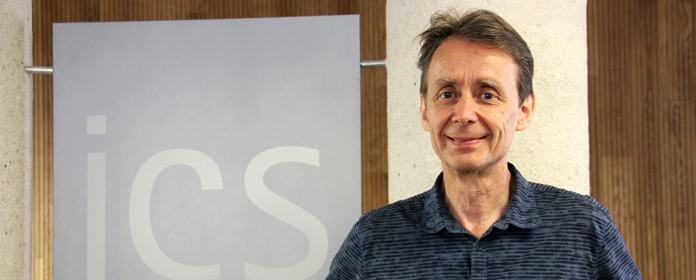Francis Steen: “Las plataformas online están tratando de hacer el trabajo de nuestro sistema cognitivo”
El profesor de la Universidad de California-Los Ángeles participó en una jornada del Instituto Cultura y Sociedad (ICS) sobre Discurso público

FOTO: Natalia Rouzaut
“Las plataformas online son una especie de consciencia artificial: están tratando de hacer el trabajo de nuestro sistema cognitivo, destacando unas posibilidades y ocultando otras”, ha afirmado en la Universidad de Navarra Francis Steen. El profesor de Estudios de Comunicación en la Universidad de California-Los Ángeles participó en una jornada del Instituto Cultura y Sociedad (ICS), financiada por el Ministerio de Economía y Competitividad.
Sobre las investigaciones de inteligencia artificial que aspira a reproducir las funciones cerebrales, el investigador cree que estas subestiman las capacidades del cerebro. Considera que ni la física ni la mecánica actual son capaces de reproducir aspectos como la creatividad o la percepción de valor. “Puede que el cerebro utilice otros tipos de física existentes, pero que todavía no hemos descubierto”, señala.
Un ejemplo de inteligencia artificial que se anticipa al pensamiento humano es el contenido basado en los usuarios de internet. En opinión de Steen, los algoritmos que eligen qué es importante para el usuario según sus ‘Me gusta’ limitan la visión del público y merman su capacidad de decisión. “Recibes aquella información que te gusta”, explica, “lo cual supone que se refuerza tu visión del mundo y no puedes escuchar otras voces”. Frente a esto, el experto destaca que los medios de comunicación tradicionales ofrecen nuevos puntos de vista e información que la audiencia desconoce.
Steen ha analizado cómo se comportan las personas en escenarios alternativos y de qué forma tanto los medios de comunicación como las tecnologías online alteran la visión de lo posible. Apunta que los seres humanos desean conocer las posibilidades y consecuencias de los hechos para poder controlarlos. Por ese motivo, sostiene que la mayoría de las noticias “dan prioridad a lo posible sobre los hechos, como ocurre con nuestro sistema cognitivo”.
Periodismo: analizar hechos para cambiar la realidadDe acuerdo con el profesor, los informativos dan más importancia a lo posible; como quién ganará las primarias del PSOE en España, las consecuencias de una promesa electoral de Trump o incluso el pronóstico del tiempo. Expone que esto sucede porque, si se comprende qué factores intervienen en un hecho y las consecuencias que este puede tener, es posible decidir cuándo y cómo actuar para cambiar la realidad.
Asimismo, Steen asigna a los medios el papel de reflexionar sobre los “hechos indeseables” que han ocurrido para evitar su repetición. “Los periódicos están llenos de artículo sobre por qué ganó el Brexit. No podemos pararlo, pero queremos entender lo que pasó”, ejemplifica.
Estas fueron las aportaciones de Francis Steen en un congreso de la línea Creatime, enmarcado en el proyecto de investigación ‘Discurso público’ del Instituto Cultura y Sociedad (ICS) de la Universidad de Navarra. Creatime trata de comprender la creatividad humana mediante el estudio de la imaginación y la representación del tiempo en la conversación oral, el lenguaje no verbal (los gestos), el cine y la poesía.
